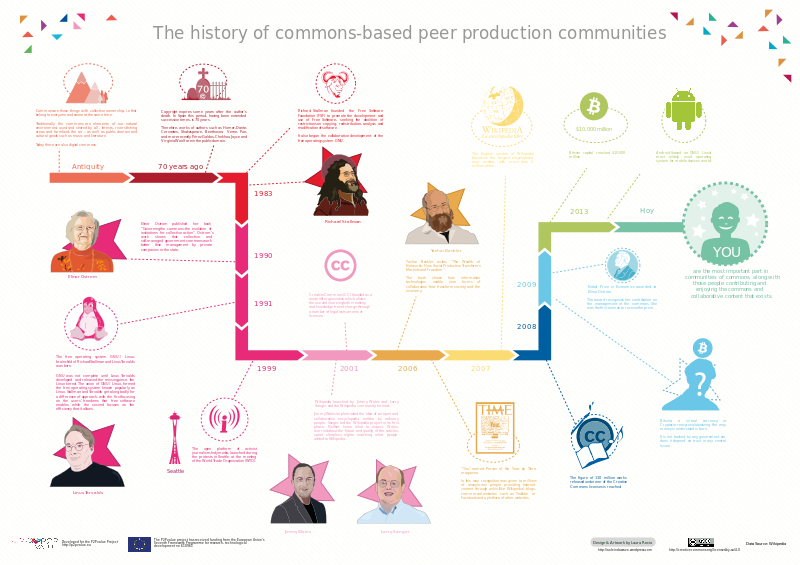
Towards a degrowth praxis for commons-based peer production
The last two days I was taking part at an inspiring workshop organised by the European consortia P2Pvalue. These guys got a large EU funding for bringing together much of the stuff related to the digital commons and commons-based peer production (CBPP) and trying to come up up technological solutions and platforms to further promote it.
With GROWL are pioneering an approach, by starting our process (bootstrapping) from within communities (including temporary physical communities such as the GROWL courses, or permanent like the "relays") and initiatives, which are not usually related to typical peer production communities, but nevertheless sharing very common praxis. The biggest challenge this brings is to be able to make our degrowth and related communities of practice aware that the CBPP praxis and philosophy are part of our DNA, but that its expression is blocked by technological and institutional lock-ins.
Moving towards a degrowth praxis for CBPP means deconstructing and overcoming existing models of organisation and (re)learning how to collaborate with peers within and between communities of practice. This implies getting a broader acceptance of the importance of digital media, communication and platforms within these communities, which are often technology critical or passive (e.g. relying on corporate owned cloud services like Google Drive or Dropbox). It requires training, advocacy and the involvement of the users in the production of their own tools. But also the creation of new methodologies of management and planning that are able to involve these communities on the peer production at different levels - writing texts, co-producing media, developing software and tools, co-organising courses, etc..
Much of my recent efforts have been on learning what the business world has brought with management concepts such as Lean and Agile, and bridging it with own experience in community building, organizing and grassroots democracy, in order to provide fundamentally new ways of articulating discourses, knowledges and action. I want to go beyond the frustrating idleness of assembliary processes, so typical in community and grassroots organisations. "Less talk, more action", was a slogan often used on protests at the climate summits, dominated by business-as-usual diplomacy and politics, unable to effectively address the urgency of the climate crisis. And what are we, many of our groups and networks actually doing? Talking all the time, either because we find that plenary decisions are the only way to have grassroots democratic legitimacy, or because people (volunteers, precarious) are constantly coming and going, so everything needs to be repeated and relearned again and again.
On the other hand, because blind actionism (not to confuse with activism) can also lead to command and control, exclusion, and disruption of groups. So, we need to break up with these old logics of negotiation and organisation. We need to learn what means to be agile and implement a new praxis in our collective processes, because only agile processes conducted on transparent constituents are able to combine both effective action and democracy.
I was happy to have gotten a scholarship from P2Pvalue to come to London and present GROWL. Most importantly, it provided an opportunity to link our developments with the amazing stuff being done by the people that were present there (kudos for the P2Pvalue team for bringing all this people together and especially Chris from the P2P Foundation for inviting me to apply). I have attached the presentation of my Lightning Talk on GROWL, co-munity, commons-based peer production, agile and collective action. A video of my talk (and many other inspiring projects and ideas presented there) is available at the P2Pvalue blog.
This is only the beginning. Expect new great collaborations popping out soon, where the communities on degrowth, transition, food sovereignty, solidarity economies, etc. come together with the free software developers and digital advocacy initiatives.
On my way to Poland now for the next GROWL course, I'm looking forward to further discuss all these ideas with those of you coming there, convivially, with a glass of wine (or tea) at the fireplace. For all others not coming there, you can still join the relatively less convivial version of debating on co-munity ;)
- 1607 reads
| Attachment | Size |
|---|---|
| 1.38 MB |

